Email marketing remains one of the most powerful tools for small businesses to stay connected with their audience, enhance brand awareness, and drive customer engagement.
With so many email marketing tools and platforms available, it can be tough to decide which one is right for you. Whether you’re an entrepreneur just starting out or an established business owner aiming to scale, the right email marketing software can make all the difference.
In this guide, we’ll explore the best email marketing services for small businesses, comparing key features, pricing, and benefits to help you find the ideal platform for your email campaigns and overall marketing strategy.
Top Email Marketing Services for Small Businesses
1. Mailchimp: All-in-One Marketing Hub for Small Businesses
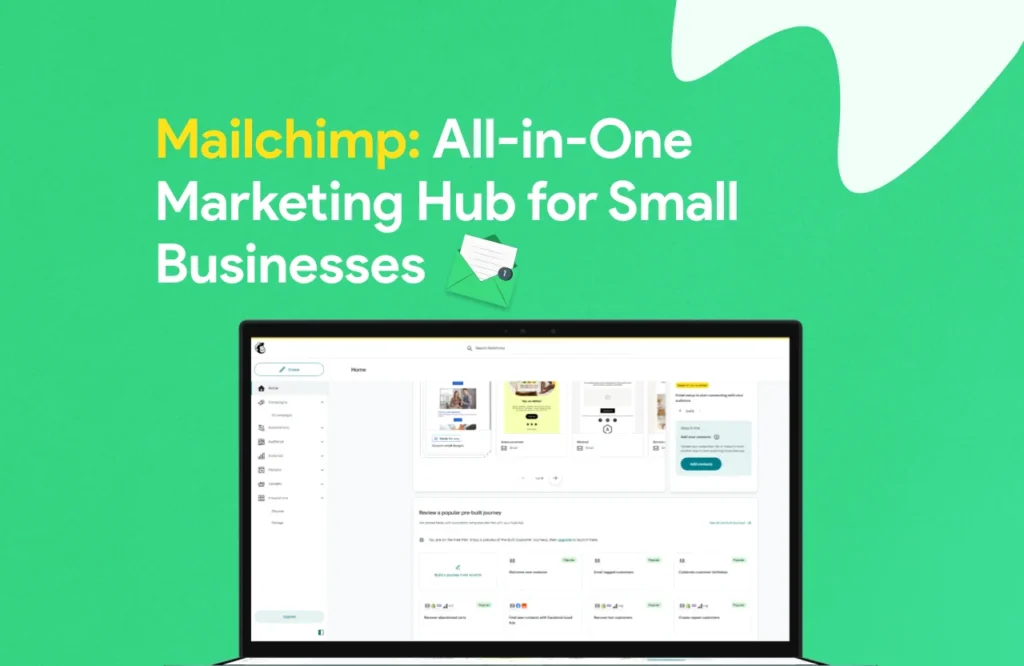
Mailchimp is one of the most popular email marketing platforms for small businesses.
Whether you’re an e-commerce business or simply want to keep in touch with your customers, Mailchimp’s user-friendly interface makes it easy to create, send, and track your email campaigns.
Why You’ll Love It:
Mailchimp is an all-in-one marketing solution.
From email automation to social media ads, it offers a comprehensive set of tools for growing your business.
Plus, it’s perfect for beginners with its free plan, supporting 500 contacts and 1,000 emails per month.
Key Features:
- Free plan with up to 500 contacts and 1,000 emails/month
- Email templates and drag-and-drop design tools
- Marketing automation to streamline campaigns
- Over 300 integrations with third-party tools
Pricing:
Starts at $9/month after the free plan.
2. Brevo (formerly Sendinblue): Best for Email Marketing Automation
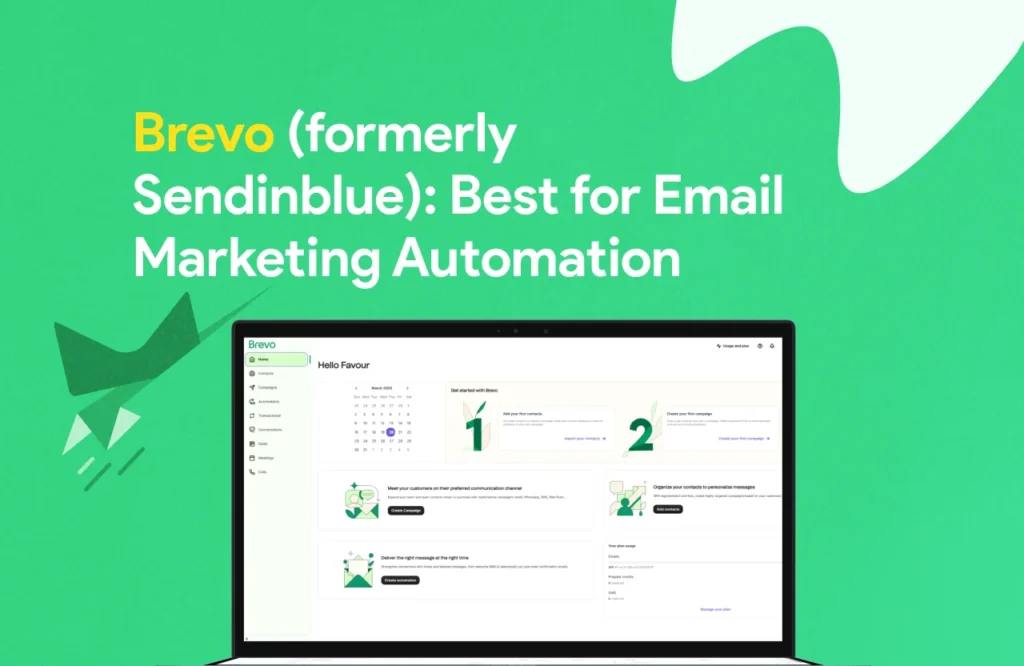
If you’re looking for email marketing automation with a powerful CRM, Brevo (formerly Sendinblue) is a fantastic choice.
Brevo excels in delivering personalized content to your audience at exactly the right time, making it perfect for small business marketing automation.
Why You’ll Love It:
Brevo’s email and SMS marketing features are ideal for businesses that want to create multi-channel campaigns.
With its CRM tools and AI-powered features, it allows for highly targeted email marketing that drives real results.
Key Features:
- Free plan for up to 300 daily emails
- Email automation for automated workflows
- CRM integration for tracking customer data
- AI-driven predictive analytics and personalized email content
Pricing:
Starts at $9/month after the free plan.
3. MailerLite: Affordable Email Marketing for Small Businesses
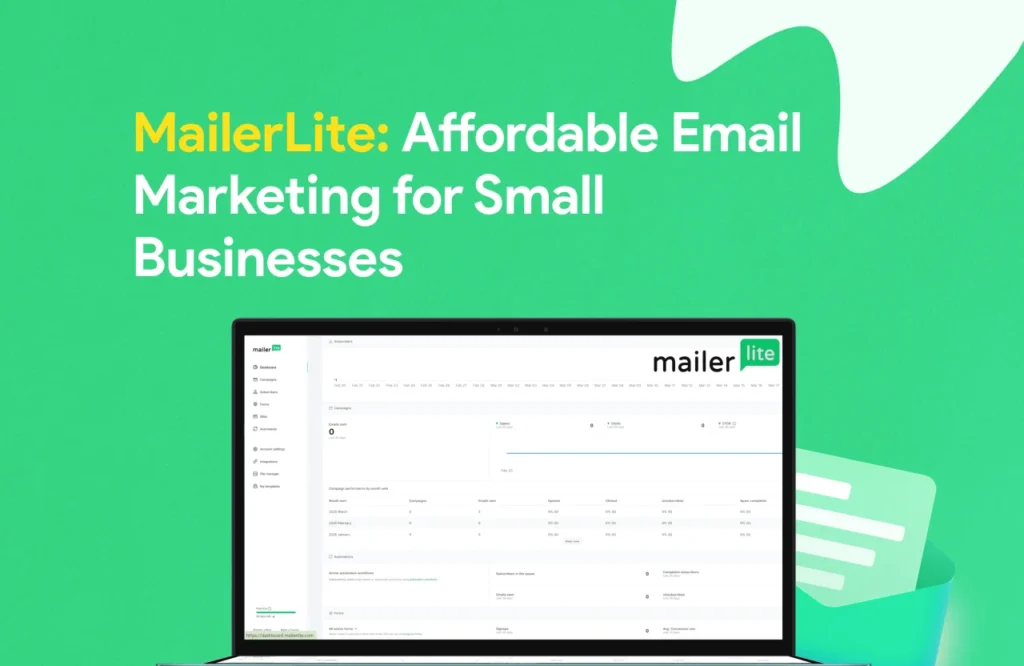
MailerLite is a budget-friendly email marketing software with powerful features that cater to businesses just getting started.
It’s a perfect choice for those needing basic email automation and e-commerce integrations.
Why You’ll Love It:
MailerLite offers a simple interface and affordable pricing, making it great for businesses on a budget.
It provides email automation, landing pages, and A/B testing, ensuring that your emails reach the right audience.
Key Features:
- Free plan for 1,000 subscribers and 12,000 emails/month
- Email automation with templates
- Landing page builder and A/B testing features
- E-commerce integrations with WooCommerce and Shopify
Pricing:
Starts at $10/month after the free plan.
4. Zoho Campaigns: Best for SMBs on a Tight Budget
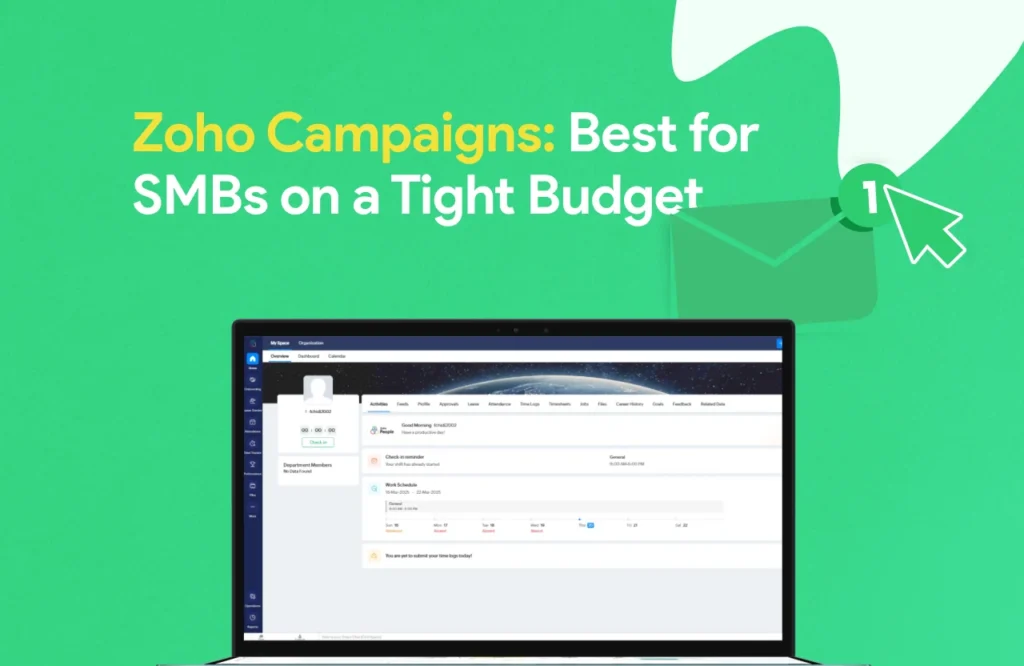
Zoho Campaigns is ideal for small businesses that need a reliable and affordable email marketing service.
It integrates seamlessly with Zoho’s suite of business tools, making it a great choice for SMBs already using Zoho products.
Why You’ll Love It:
Zoho Campaigns offers a user-friendly interface with email marketing tools, including automation, A/B testing, and SMS marketing.
It’s especially beneficial for businesses needing both contact management and marketing automation.
Key Features:
- Free plan for up to 6,000 emails/month
- SMS marketing and email automation tools
- Contact management and segmentation
- A/B testing and e-commerce features
Pricing:
Starts at $4/month after the free plan.
5. GetResponse: Best for Content Creators and E-Commerce
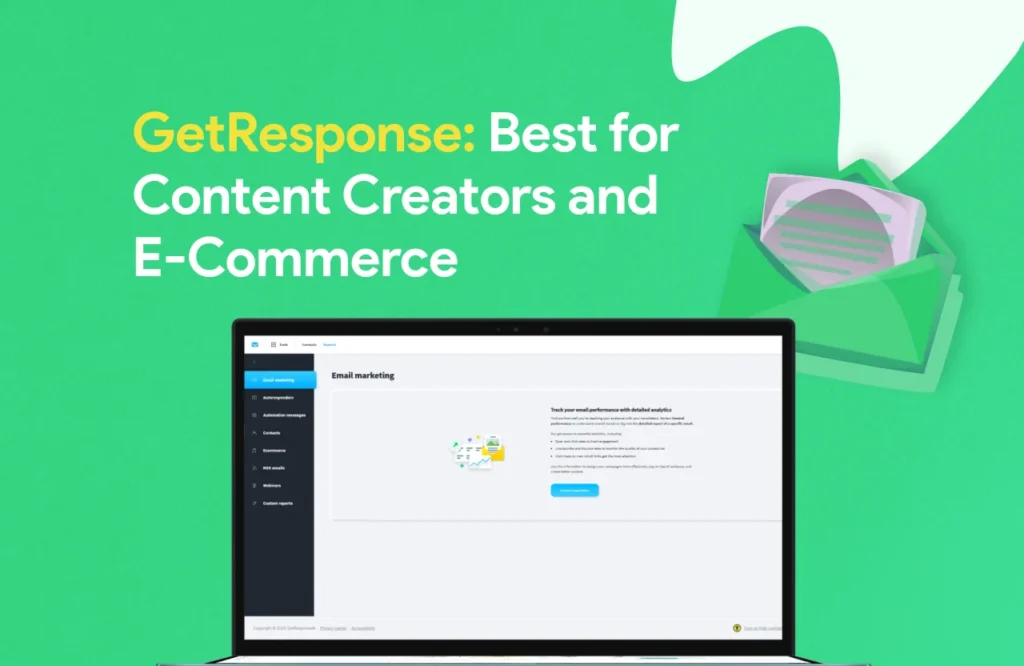
For businesses looking to monetize their email content, GetResponse offers a comprehensive suite of tools, including landing pages, webinars, and AI-driven email marketing.
Why You’ll Love It:
GetResponse is perfect for content creators or e-commerce stores that want to automate their email marketing campaigns and drive conversions. It’s great for small businesses that need tools for creating sales funnels and landing pages.
Key Features:
- 30-day free trial with advanced features
- Email automation and sales funnels
- Webinar hosting and AI-powered tools
- E-commerce integrations like WooCommerce and Shopify
Pricing:
Starts at $19/month after the free trial.
6. ActiveCampaign: Best for Automation and CRM Integration
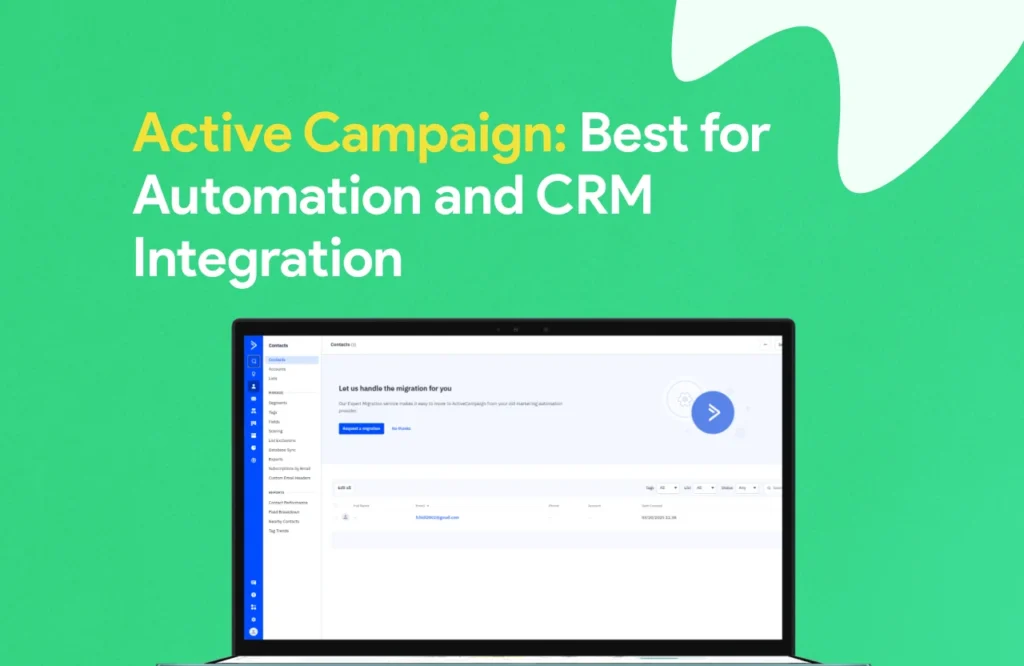
If your business needs advanced automation and a powerful CRM system, ActiveCampaign should be on your list.
It’s perfect for businesses that want to deliver highly personalized email campaigns and streamline customer management.
Why You’ll Love It:
ActiveCampaign makes automating workflows and segmenting your audience incredibly easy.
With features like CRM integration and advanced reporting, it’s perfect for businesses looking to scale and improve engagement.
Key Features:
- Advanced automation workflows
- CRM integration and customer tracking
- Detailed reporting and A/B testing
- Over 800 integrations with third-party apps
Pricing:
Starts at $15/month after the 14-day free trial.
7. Constant Contact: Best for Event Marketing

If your business hosts events regularly, Constant Contact is a great option.
It’s tailored for event marketing with tools for RSVP management, ticketing, and automated follow-up emails.
Why You’ll Love It:
Along with email marketing, Constant Contact offers excellent tools for event promotion.
It’s ideal for small businesses that regularly host webinars, workshops, or product launches.
Key Features:
- Event marketing tools (RSVP, ticketing)
- Email automation and reporting
- Landing page builder and website integration
- Over 300 integrations
Pricing:
Starts at $12/month (30-day free trial available).
8. SendGrid: Best for Developers and API Integrations
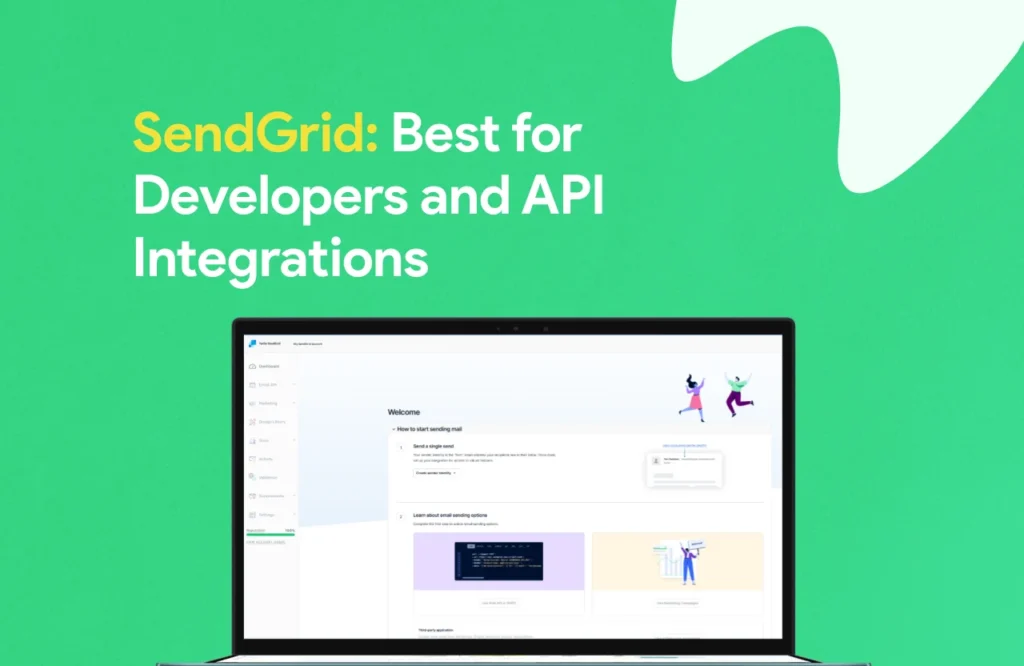
For businesses with tech-savvy teams, SendGrid offers advanced API integrations and email deliverability tools.
It’s a perfect fit for developers who need more control over their email infrastructure.
Why You’ll Love It:
SendGrid allows you to integrate email marketing directly into your app or website. Its powerful email API lets developers build and automate email campaigns without the need for a third-party tool.
Key Features:
- Advanced API integrations for developers
- Email deliverability and A/B testing
- Powerful email analytics tools
- Automation for customer workflows
Pricing:
Starts at $19.95/month for 50,000 emails.
9. Drip: Best for E-commerce and Customer Journey Tracking
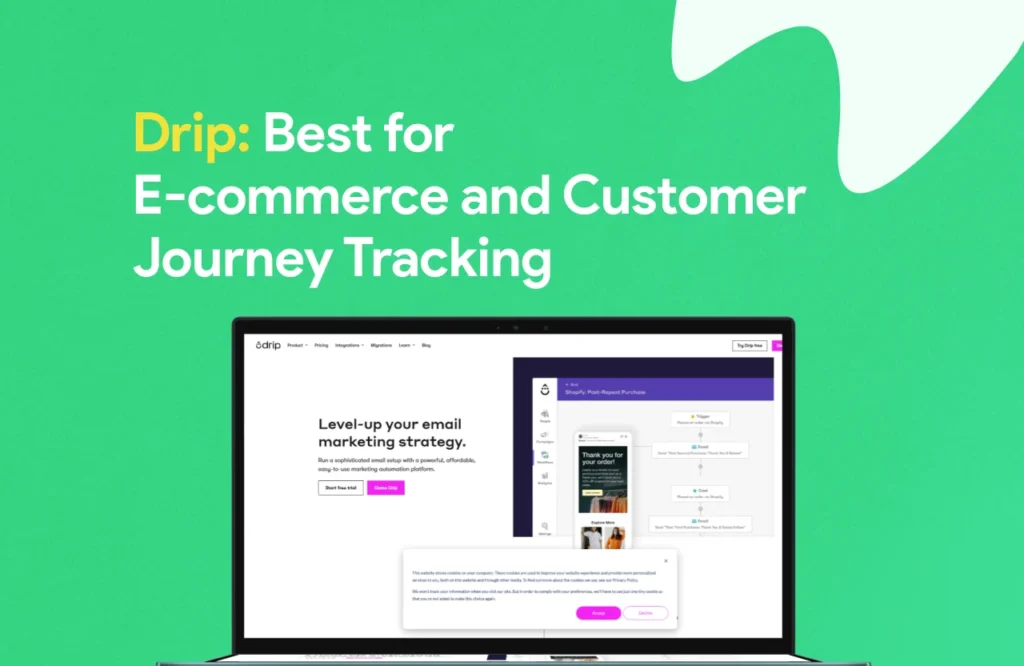
Designed specifically for e-commerce, Drip helps businesses track the customer journey and send personalized emails based on user behavior.
Why You’ll Love It:
Drip offers advanced segmentation and powerful e-commerce integrations that allow you to send highly relevant emails to your customers, guiding them through the buying process.
Key Features:
- Customer journey tracking
- E-commerce platform integration (Shopify, WooCommerce)
- Personalized email automation
- A/B testing and conversion tracking
Pricing:
Starts at $39/month after the 14-day free trial.
10. Omnisend: Best for Multichannel Marketing

If you’re looking for a multichannel marketing tool that goes beyond just email marketing, Omnisend has you covered.
It supports SMS, push notifications, and even WhatsApp, all in one platform.
Why You’ll Love It:
Omnisend’s ability to run cross-platform campaigns makes it a great option for businesses that want to engage customers through more than just email.
Whether through SMS, email, or push notifications, Omnisend helps drive conversions through multichannel campaigns.
Key Features:
- Email, SMS, and push notification marketing
- Advanced automation workflows
- E-commerce integrations with Shopify, WooCommerce
- Detailed reporting and analytics
Pricing:
Starts at $16/month for the Standard plan.
How to Choose the Best Email Marketing Software for Your Business
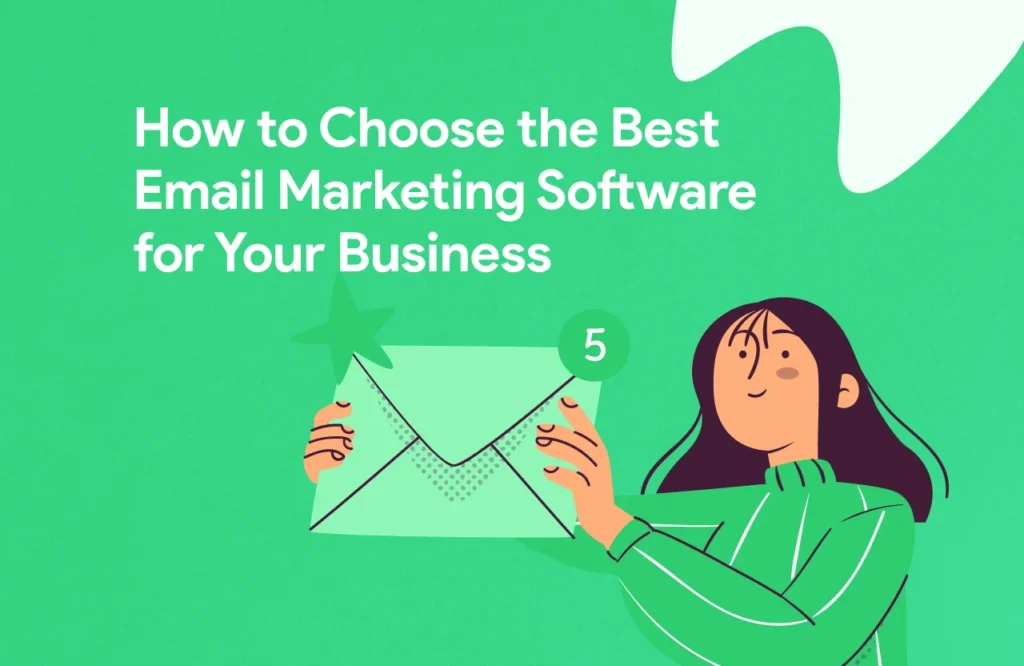
When it comes to selecting the best email marketing software for small businesses, there are several factors to consider.
With so many options out there, you want to make sure you choose the right platform for your needs.
1. Ease of Use
Look for a platform that is easy to navigate and doesn’t require a technical background.
Tools like Mailchimp, MailerLite, and Constant Contact are great for beginners due to their user-friendly interfaces and simple setup processes. If you’re just getting started with email marketing, you can explore our beginner’s guide on how to succeed with email campaigns
2. Features & Customization
Make sure the platform offers the features that align with your business needs.
For example, if you need advanced email automation, CRM integration, or e-commerce support, platforms like Brevo and Drip provide these options.
MailerLite and Zoho Campaigns are great for businesses that need basic features but at an affordable price.
3. Pricing and Plans
Consider your budget and how much you’re willing to spend as your business grows.
Many platforms, like Zoho Campaigns and MailerLite, offer free plans or affordable pricing, while others like GetResponse and ActiveCampaign offer more advanced features at a higher cost.
4. Scalability
Look for a platform that can grow with your business.
Whether you’re just starting with a small email list or scaling up, platforms like Brevo and Omnisend offer flexible plans that can handle larger volumes as you expand.
5. Integration Capabilities
Ensure the email marketing platform integrates with the tools you already use, such as your CRM, e-commerce platform, or social media accounts.
Platforms like Mailchimp, GetResponse, and Drip offer a wide range of integrations.
FAQs
1. What is email marketing software?
Email marketing software is a tool designed to help businesses create, send, and manage email campaigns.
It provides features like email automation, template creation, analytics tracking, and list management.
With email marketing software, you can effectively communicate with customers, increase engagement, and track campaign performance.
2. Does email marketing work?
Yes, email marketing is one of the most effective ways to reach and engage with your audience.
According to studies, email marketing has one of the highest ROI (Return on Investment) compared to other marketing channels.
It allows you to reach a broad audience, segment contacts, and send personalized messages, which can boost sales and customer loyalty.
3. How do I measure email marketing success?
To measure the success of your email marketing campaigns, track metrics such as:
- Open Rate: How many recipients opened your email
- Click-through Rate (CTR): The percentage of recipients who clicked on links within your email
- Conversion Rate: The percentage of recipients who completed a desired action (like making a purchase)
- Bounce Rate: The percentage of emails that didn’t reach the recipient
- Unsubscribe Rate: The number of people who unsubscribed after receiving your email These metrics help you understand your campaign’s effectiveness and areas for improvement.
4. How do I choose an email marketing platform?
When choosing an email marketing platform, consider:
- Ease of use: Look for a user-friendly platform, especially if you’re new to email marketing.
- Features: Does the platform offer automation, A/B testing, CRM integration, and other features that suit your business?
- Pricing: Ensure the pricing fits your budget, especially as your list grows.
- Customer support: Choose a platform with good customer service, tutorials, and support options.
- Scalability: The platform should grow with your business, offering more advanced features as needed.
5. How do I get the most from email marketing software?
To get the most from your email marketing software:
- Segment your audience: Personalize emails based on customer behavior, preferences, and demographics.
- Automate your campaigns: Set up email automation to send personalized emails at the right times, such as welcome emails, abandoned cart reminders, and post-purchase follow-ups.
- Track your metrics: Monitor open rates, click-through rates, and other key metrics to refine your strategy.
- Test and optimize: Use A/B testing to experiment with different subject lines, content, and send times to see what works best.
6. How do I build a list of email addresses?
To build a list of email addresses:
- Offer incentives: Provide valuable content, discounts, or free resources in exchange for email sign-ups.
- Use sign-up forms: Place email sign-up forms on your website, blog, and social media pages.
- Host contests or giveaways: Run a contest where participants must enter their email address to win.
- Encourage referrals: Ask current subscribers to refer friends or colleagues to join your list.
7. How much is a 1000 email list worth?
The value of a 1,000-email list can vary based on factors like engagement, industry, and how targeted the list is.
Generally, if you have a high open rate and conversion rate, your list is worth more in terms of ROI.
In terms of direct monetary value, businesses often use a rough estimate of $1 per subscriber per month, but this can vary significantly.
8. What is the cheapest email marketing?
The cheapest email marketing software usually offers free plans with limited features. Here are a few options:
- MailerLite: Free for up to 1,000 subscribers and 12,000 emails per month.
- Zoho Campaigns: Free for up to 6,000 emails/month.
- Brevo (Sendinblue): Free for 300 emails/day. However, as your list grows, you may need to upgrade to a paid plan for more features and higher limits.
9. What’s better than Gmail for email marketing?
While Gmail is great for personal communication, it’s not ideal for email marketing due to limitations on mass sending, automation, and tracking.
Platforms like Mailchimp, Brevo, and MailerLite are specifically designed for bulk email sending, automation, and detailed campaign tracking.
These platforms also ensure better deliverability rates and allow you to comply with email marketing regulations.

